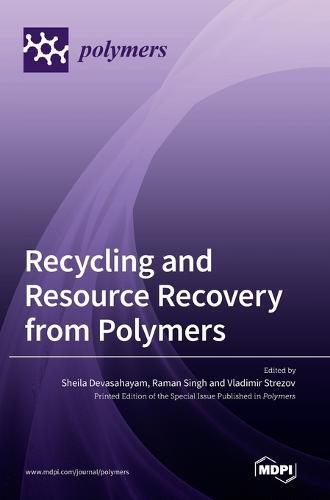Readings Newsletter
Become a Readings Member to make your shopping experience even easier.
Sign in or sign up for free!
You’re not far away from qualifying for FREE standard shipping within Australia
You’ve qualified for FREE standard shipping within Australia
The cart is loading…






This title is printed to order. This book may have been self-published. If so, we cannot guarantee the quality of the content. In the main most books will have gone through the editing process however some may not. We therefore suggest that you be aware of this before ordering this book. If in doubt check either the author or publisher’s details as we are unable to accept any returns unless they are faulty. Please contact us if you have any questions.
Environmental challenges posed by wrong end of lifeplastic management drive the plastics recycling schemes for energy recovery and cutting emissions, penalties, energy consumption, non-renewable resources, and manufacturing costs. Plastic recycling has the lowest environmental impact on global warming potential and total energy use. However, under-utilised plastic wastes due to low value issues with sorting/contamination pose major challenges. Novel technologies drive innovation in a circular economy model for plastics and employ reuse, recycling and responsible manufacture solutions, support the development of new industries and jobs, reduce emissions and increase efficient use of natural resources (including energy, water and materials). Many economies are working towards achieving a zero plastic waste economy. This Special Issue covers the applications of recycled plastics in the areas of energy recovery/alternative fuels, economic analyses, bitumen additives, flame retardants, recycled polymer nanocomposites to enhance the mechanical property, thermomechanical recycling to improve physical properties, mechano-chemical treatment, cryogenic waste tyre recycling, application in decarbonizing technology, e.g., cement industry, waste characterization, improving agricultural soil quality, as smart fertilizers. The Editors express their appreciation to all the contributors across the world in the development of this reprint. This reprint gives different perspectives and technical ideas for the transformation of plastic wastes into value-added products and to achieve higher recycling rates in the coming years.
$9.00 standard shipping within Australia
FREE standard shipping within Australia for orders over $100.00
Express & International shipping calculated at checkout
This title is printed to order. This book may have been self-published. If so, we cannot guarantee the quality of the content. In the main most books will have gone through the editing process however some may not. We therefore suggest that you be aware of this before ordering this book. If in doubt check either the author or publisher’s details as we are unable to accept any returns unless they are faulty. Please contact us if you have any questions.
Environmental challenges posed by wrong end of lifeplastic management drive the plastics recycling schemes for energy recovery and cutting emissions, penalties, energy consumption, non-renewable resources, and manufacturing costs. Plastic recycling has the lowest environmental impact on global warming potential and total energy use. However, under-utilised plastic wastes due to low value issues with sorting/contamination pose major challenges. Novel technologies drive innovation in a circular economy model for plastics and employ reuse, recycling and responsible manufacture solutions, support the development of new industries and jobs, reduce emissions and increase efficient use of natural resources (including energy, water and materials). Many economies are working towards achieving a zero plastic waste economy. This Special Issue covers the applications of recycled plastics in the areas of energy recovery/alternative fuels, economic analyses, bitumen additives, flame retardants, recycled polymer nanocomposites to enhance the mechanical property, thermomechanical recycling to improve physical properties, mechano-chemical treatment, cryogenic waste tyre recycling, application in decarbonizing technology, e.g., cement industry, waste characterization, improving agricultural soil quality, as smart fertilizers. The Editors express their appreciation to all the contributors across the world in the development of this reprint. This reprint gives different perspectives and technical ideas for the transformation of plastic wastes into value-added products and to achieve higher recycling rates in the coming years.